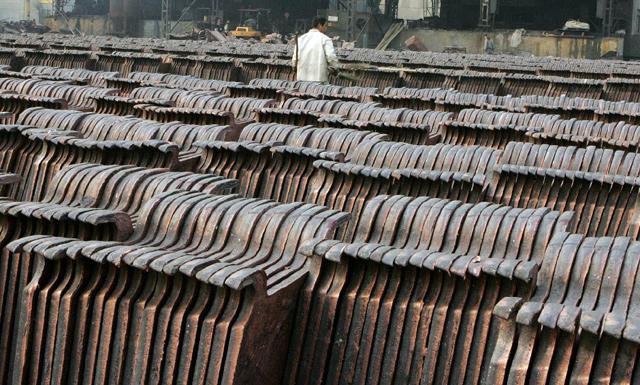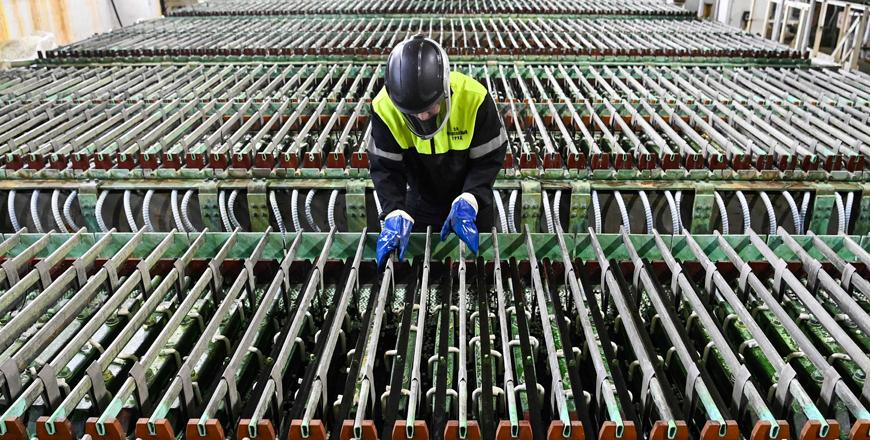You are here
China launches bid to become commodities market player
By AFP - Dec 23,2020 - Last updated at Dec 23,2020

China accounts for around half of the world's copper production (AFP photo)
LONDON — China, a big raw materials consumer, hopes to position itself as a global commodities marketplace with its launch of a new futures contract on the popular copper market.
The Shanghai International Energy Exchange (INE), a division of the Shanghai Commodity Exchange, opened the contract for the so-called eternal metal to foreign investors on November 19, following several trial runs — including one in oil — in 2018.
Copper contracts already existed in China but exclusively for domestic trading.
"The launch of bonded copper futures is necessary for the continued growth of China's copper industry," INE has said.
Philippe Sebille-Lopez, of the Geopolia Institute, called it was a shrewd move by China, given its reliance on certain commodities to power its economy.
"The greater the Chinese market share for a given raw material, the more Shanghai will be able to attract foreign investors," he said.
The world's factory accounts for around half of global copper production but it faces an uphill struggle to win business.
London's edge
Although large brokerage companies want a presence in Shanghai, its trading volume remains very low compared with London, by far the bigger sister in the relationship.
London has historically dominated exchanges.
The London Metal Exchange (LME), which was founded in 1877, proclaims itself the "world centre" for industrial metals trading, especially non-ferrous metals such as copper, alminium, lead and zinc.
The LME, a subsidiary since 2012 of the HKEX — owner of the Hong Kong Stock Exchange — has significant technical advantages to retain its pre-eminence.
They include a network of warehouses around the world as well as a degree of liquidity and flexibility that its superior size provides.
It also has "the 'date structure' — you can trade for any single day," Marc Bailey, head of Sucden trading house, told AFP.
"That uniqueness makes it extremely attractive to trade," he added.
Sebille-Lopez nonetheless sees an opening for Shanghai.
"Each new contract is interesting because it presents margin opportunities," compared with other markets, he added.
Sucden has not yet opened its exchanges on INE to its customers, and just trades itself on the new market primarily because of currency conversion benefits.
'Political ambition'
Another disadvantage for investors is that the INE and its contracts are denominated in the Chinese yuan, which Beijing keeps a firm control of.
But the copper launch is also the latest step in China's slow evolution towards freer convertibility of its currency.
"It's actually the mechanics, in that the INE have created a copper futures contract that allows us to trade onshore in renminbi, then covert the profits through a Bank of China account back to dollars," explained Bailey.
"The converted dollars can be in a Hong Kong bank account in an hour or two, this is a fundamental difference from where we were before," he said, adding that is how "Beijing is allowing more access to the Chinese market".
The price of copper is tracked particularly because it is often considered a good indicator of the health of the world economy.
Copper is widely used across various industries, in particular in electrical circuits used everywhere, from real estate to vehicles and household appliances.
Related Articles
BEIJING — The play by Xiang Guangda, China's "Nickel King", was to use his influential market position to short the metal, wait for the pric
LONDON — Stock markets fell, metals prices hit record highs and oil surged on Monday after the United States raised the prospect of an embar
LONDON — Copper and iron ore prices hit record highs on Friday as demand for the key commodities surges on the back of a powerful recovery i




















